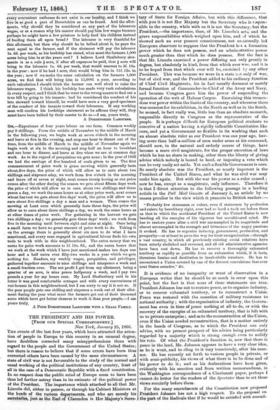Srs,—Experience of four years labour on one farm. Common weekly
pay 9 shillings. From the middle of November to the middle of March in the following year, we begin work at seven o'clock in the morning and leave at five in the evening, and stop one hour to dinner out of the time, from the middle of March to the middle of November again we begin work at six in the morning and stop half an hour to breakfast and one hour to dinner, and leave at five when we are at common day work. As to the regard of perquisites we gets none ; in the year of 1862 we had the carriage of five hundred of coals given to us. The first commencment of peice work is grass mowing which generally lasts about.five days, the price of which will allow us to earn about two shillings and sixpence aday, we work from five o'clock in the morning and leave off at seven at night, next comes turnip hoeing as one peice comes after the other during the season we gets about fifteen days work the price of which will allow us to earn about two shillings and three pence a day, we work the same hours as at other peice work, next comes wheat harvest we gets about five days' work, the price will allow us to earn about five shillings a day a man and a woman. Then comes the mowing at Lent corn which generally lasts three days, the price will allow us to earn about three shillings a day, we work the same hours as at other times of peice work. For gathering in the harvest we gets two shillings a day ; we generally gets three days' work ; we work from five in the morning until between eight and nine at night. Ours being a small farm we have no great amount of peice work to do. Taking it on the average there is generally about six men to do what I have mentioned, and every man engaged in agricultural labour finds his own tools to work with in this neighbourhood. The extra money that we earns for peice work amounts to 1/. 19s. 9d., and the extra hours that we work at the work which I have just mentioned makes ten days one hoar and a half extra over fifty-two weeks in a year which we gets nothing for. Readers, my weekly wages, perquisites, and privileges, gathered together amounts to nine shillings and ninepence a week and a small fraction over. The net profit I get from my allotment, being a quarter of an acre, is nine pence halfpenny a week, and I pay two pounds a year for my house rent. My Lord Shaftesbury said in his letter it was good comfortable cottages and with every convenience of out-houses in this neighbourhood, but I am sorry to say it is not so. If the poor people gets one shilling and sixpence a week out of their allot- ment during the year what must the farmers get out of their thousand acres which have got better chances to work it than poor people.—I am yours truly,
A POOR DORSETSHIRE LABOURER WITH A SMALL FAMILY.






























 Previous page
Previous page